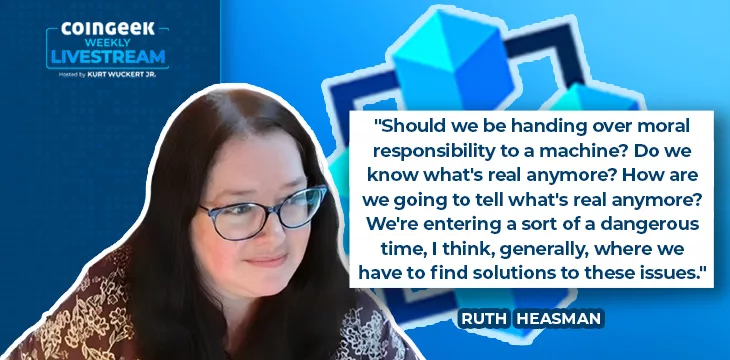
|
Getting your Trinity Audio player ready... |
Author Ruth Heasman has joined the CoinGeek Weekly Livestream to discuss her new BSV-inspired novel. Kurt Wuckert Jr. hosted her and asked all the right questions in a discussion about artificial intelligence (AI), blockchain, and what our high-tech future might look like. Is the singularity near? Tune in to find out!
The London Blockchain Conference 2024
Heasman and Wuckert met at the London Blockchain Conference 2024, and they both enjoyed it a lot. They discuss the new format and the awesome BSV DevCon the day before.
Both made many great connections, found the presentations and guests interesting and informative, and hope to see more sessions online.
Heasman’s new book and our high-tech future
Heasman then tells us about her new book, which Wuckert says he’s about halfway through. It’s a novel about AI, BSV, and technology in general. However, rather than being a mere story, it also touches on philosophical and social questions she thinks are important. She calls it a “novel rooted in truth.”
Do we have any responsibilities to machines? How will we grapple with some of the issues and dilemmas technology raises? The book tackles these questions, which Heasman says are “coming thick and fast,” and to which we have to find answers and solutions.
One of the big issues regarding AI, central bank digital currencies (CBDCs) and this new wave of technology is control. How will we get it back? AI is already an expert at manipulating human behavior, and soon, the majority of content we view will be AI-generated. Heasman believes Bitcoin is part of the solution, but she doesn’t elaborate too much for fear of giving away the plot.
An AI-powered world
The interview then delves deeper into AI and the issues it raises. Wuckert notes that it would be relatively easy for someone to take all of his written articles and interviews and train an AI to replace him. This AI wouldn’t get sick, have bad moods, or have any human frailties.
Looking back, Wuckert notes that many writers had the same concerns regarding machines that replaced laborers back in the day. Some of them were proto-communists and were concerned about mass job displacement, but in the end, new jobs were also created, and the machines brought about many benefits.
Heasman agrees, likening trying to ban machines as similar to trying to ban shovels to make men dig holes with spoons. It’s futile, and we can’t put the genie back in the bottle. We must learn to live with AI, and her book tackles at least some of the questions we need to answer to do so.
Viewer questions and answers
Alex Vidal then takes some viewer questions and both Wuckert and Heasman answer them.
Q. Do you think tying published data to identity will help prevent AI misuse?
A. We’ll need some way to categorize information by who created it, where, and when. How we’ll do this is as yet unknown, but it needs to take privacy into consideration.
Q. Any thoughts on Ray Kurzweil’s Theory of the Singularity?
A. Heasman says he’s “bang on time” in his predictions for the world in 2030. We may experience rapid breakthroughs in physics, chemistry, and other areas of science and technology. It may be possible to run tens of millions of experiments in simulated environments in no time at all.
Wuckert agrees that, for real academics trying to use the knowledge of the species to advance it, AI is an extremely powerful and awesome tool.
Tune into the livestream to hear more about the London Blockchain Conference, Teranode, and other exciting BSV-related news.
In order for artificial intelligence (AI) to work right within the law and thrive in the face of growing challenges, it needs to integrate an enterprise blockchain system that ensures data input quality and ownership—allowing it to keep data safe while also guaranteeing the immutability of data. Check out CoinGeek’s coverage on this emerging tech to learn more why Enterprise blockchain will be the backbone of AI.
Watch: Blockchain, IPv6, AI & 5G will pave the way for the new Internet

 11-22-2024
11-22-2024


